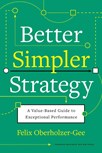- Strategy
Better, Simpler Strategy
Harvard's Felix Oberholzer-Gee presents a strategic framework for a post-pandemic trajectory to growth and financial success

Felix Oberholzer-Gee’s new book offers organizations a value-based framework for cutting through the uncertainty, clarifying their strategy, and setting a path to sustained financial success. Oberholzer-Gee, a professor in the Strategy Unit at Harvard Business School, opens by saying “Strategy is simple”—a puzzling statement when many sectors are confronted with complex issues around supply-chain, market, and technological disruption—but he qualifies this by saying “Seeing the simplicity of strategy is not easy.” In fact, it has taken him many years’ research to get to this himself.
The message he shares in this book is that, in a complex world, organizations too often resort to sophisticated initiatives, and laborious overly bureaucratic processes to develop strategy—to the point where many companies seem to have given up on strategy altogether. Whereas were they just to focus on the basic dynamics of value creation and delivery they would find a better, simpler strategic path.
Rather than developing strategies for every corner of the business—in marketing, talent pipeline, innovation cycle, resilience, etc.—companies should go back-to-basics and restrict strategy to an overarching simple framework linking value creation to financial success. This can then guide how all the operational strands of the business are evaluated and pulled together. It is a classic case, he says, of how by “concentrating on all the trees, we lose sight of the forest.”
Oberholzer-Gee proposes a framework he calls a Value Stick—a stick to measure the value created between two points: Willingness-to-Pay (WTP), at the top of the stick, representing the customers’ perspective, and Willingness-to-Sell (WTS), at the bottom, referring to the compensation required by employees and suppliers to deliver the company’s products and services.
The difference between WTP and WTS, the length of the stick, is the value a company creates. The aim of strategy should be to lengthen the stick to create more value, by either raising WTP or lowering WTS. Raising WTP is about improving products, services and customer experience to support the price customers are prepared to pay, lowering WTS means reducing the compensation required by employees and suppliers by making work more attractive and making it easier for suppliers to produce and ship the company’s products.
The heart of the book looks in detail at the many ways to lengthen the stick, with reference to real-world examples from companies—from Best Buy to Whirlpool—that have followed this approach. Here the author offers many insights: such as how ideas from employees can raise productivity, and how the best opportunities and prospects for performance gains usually sit close to home. He cautions that strategic thinking that results in a long list of issues to resolve, projects to complete, and services to improve should be countered with “What will we stop doing?” And he recommends using ‘value maps’ to see competitive standing, find opportunities, and connect strategy with operations.
Oberholzer-Gee points to the poor (presumably pre-pandemic) state of firm profitability, noting that a quarter of the firms in the S&P 500 and close to a third of Chinese firms fail to earn long-term returns in excess of their cost of capital—arguing this is down to weak strategic decision making. In a world economy in need of a major boost to rebuild and grow after the trauma of the pandemic, Oberholzer-Gee’s Value Stick prescription has great relevance.
‘Better, Simpler Strategy: A Value-Based Guide to Exceptional Performance,’ by Felix Oberholzer. Published by Harvard Business Review Press, April 2021, ISBN 978-1-63369-969-4
ARTICLES YOU MIGHT LIKE
BOOK REVIEW
A provocative new book reveals the downside of strategic and organizational change and the benefits of stability
DEVELOPING LEADERS QUARTERLY MAGAZINE AND WEEKLY BRIEFING EMAILS

































